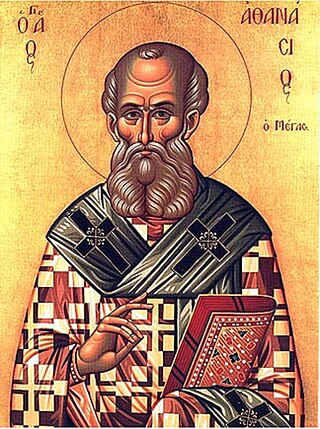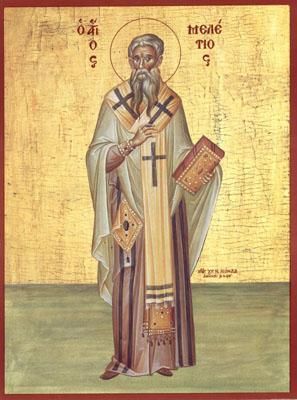Related Research Articles
Arianism is a Christological doctrine considered heretical by all modern mainstream branches of Christianity. It is first attributed to Arius, a Christian presbyter who preached and studied in Alexandria, Egypt. Arian theology holds that Jesus Christ is the Son of God, who was begotten by God the Father with the difference that the Son of God did not always exist but was begotten/made before time by God the Father; therefore, Jesus was not coeternal with God the Father, but nonetheless Jesus began to exist outside time.

The Athanasian Creed—also called the Pseudo-Athanasian Creed or Quicunque Vult, which is both its Latin name and its opening words, meaning "Whosoever wishes"—is a Christian statement of belief focused on Trinitarian doctrine and Christology. Used by Christian churches since the early sixth century, it was the first creed to explicitly state the equality of the three hypostases of the Trinity. It differs from the Nicene-Constantinopolitan Creed and the Apostles' Creed in that it includes anathemas condemning those who disagree with its statements.

Athanasius I of Alexandria, also called Athanasius the Great, Athanasius the Confessor, or, among Coptic Christians, Athanasius the Apostolic, was a Christian theologian and the 20th pope of Alexandria. His intermittent episcopacy spanned 45 years, of which over 17 encompassed five exiles, when he was replaced on the order of four different Roman emperors. Athanasius was a Church Father, the chief proponent of Trinitarianism against Arianism, and a noted Egyptian Christian leader of the fourth century.
Eusebius of Caesarea, also known as Eusebius Pamphilius, was a Greek Syro-Palestinian historian of Christianity, exegete, and Christian polemicist. In about AD 314 he became the bishop of Caesarea Maritima in the Roman province of Syria Palaestina.

The First Council of Nicaea was a council of Christian bishops convened in the Bithynian city of Nicaea by the Roman Emperor Constantine I. The Council of Nicaea met from May until the end of July 325.
Socrates of Constantinople, also known as Socrates Scholasticus, was a 5th-century Greek Christian church historian, a contemporary of Sozomen and Theodoret.

Didymus the Blind was a Christian theologian in the Church of Alexandria, where he taught for about half a century. He was a student of Origen, and, after the Second Council of Constantinople condemned Origen, Didymus's works were not copied. Many of his writings are lost, but some of his commentaries and essays survive. He was seen as intelligent and a good teacher.

Saint Meletius was a Christian bishop of Antioch from 360 until his death in 381. However, his episcopate was dominated by a schism, usually called the Meletian schism.

Arius was a Cyrenaic presbyter and ascetic. He has been regarded as the founder of Arianism, which holds that Jesus Christ was not coeternal with God the Father, but was rather created before time. Arian theology and its doctrine regarding the nature of the Godhead held in common a belief in subordinationism with most Christian theologians of the 3rd century, with the notable exception of Athanasius of Alexandria.

Lucian of Antioch, known as Lucian the Martyr, was a Christian presbyter, theologian and martyr. He was noted for both his scholarship and ascetic piety.
Semi-Arianism was a position regarding the relationship between God the Father and the Son of God, adopted by some 4th-century Christians. Though the doctrine modified the teachings of Arianism, it still rejected the doctrine that Father, Son, and Holy Spirit are co-eternal, and of the same substance, or consubstantial, and was therefore considered to be heretical by many contemporary Christians.

St. Lucifer of Cagliari was a bishop of Cagliari in Sardinia known for his passionate opposition to Arianism. He is venerated as a Saint in Sardinia.
Homoousion is a Christian theological term, most notably used in the Nicene Creed for describing Jesus as "same in being" or "same in essence" with God the Father. The same term was later also applied to the Holy Spirit in order to designate him as being "same in essence" with the Father and the Son. Those notions became cornerstones of theology in Nicene Christianity, and also represent one of the most important theological concepts within the Trinitarian doctrinal understanding of God.

In Christian theology, the incarnation is the belief that the pre-existent divine person of Jesus Christ, God the Son, the second person of the Trinity, and the Logos, "was made flesh" by being conceived in the womb of a woman, the Virgin Mary, also known as the Theotokos. The doctrine of the incarnation then entails that Jesus was at the same time both fully God and fully human.
The First Synod of Tyre or the Council of Tyre was a gathering of bishops called together at Tyre by Emperor Constantine I for the primary purpose of evaluating charges brought against Athanasius, the Patriarch of Alexandria, who was deposed by the council.

Subordinationism is a Trinitarian doctrine wherein the Son is subordinate to the Father, not only in submission and role, but with actual ontological subordination to varying degrees. It posits a hierarchical ranking of the persons of the Social Trinity, implying ontological subordination of the persons of the Son and the Holy Spirit. It was condemned as heretical in the Second Council of Constantinople.
The Arian controversy was a series of Christian disputes about the nature of Christ that began with a dispute between Arius and Athanasius of Alexandria, two Christian theologians from Alexandria, Egypt. The most important of these controversies concerned the relationship between the substance of God the Father and the substance of His Son.
The Pneumatomachi, also known as Macedonians or Semi-Arians in Constantinople and the Tropici in Alexandria, were an anti-Nicene Creed sect which flourished in the regions adjacent to the Hellespont during the latter half of the fourth, and the beginning of the fifth centuries. They denied the godhood of the Holy Ghost, hence the Greek name Pneumatomachi or 'Combators against the Spirit'.
Pierius was a Christian priest and probably head of the Catechetical School of Alexandria, conjointly with Achillas. He flourished while Theonas was bishop of Alexandria, and died at Rome after 309. The Roman Martyrology commemorates him on 4 November.

The Church Fathers, Early Church Fathers, Christian Fathers, or Fathers of the Church were ancient and influential Christian theologians and writers who established the intellectual and doctrinal foundations of Christianity. The historical period in which they worked became known as the Patristic Era and spans approximately from the late 1st to mid-8th centuries, flourishing in particular during the 4th and 5th centuries, when Christianity was in the process of establishing itself as the state church of the Roman Empire.
References
- Ceillier, Remy. Histoire Générale des Auteurs Sacrés et Ecclesiastiques (General History of Sacred and Ecclesiastical Authors) 2:450. (in French)
- Migne, Jacques Paul. Patrologia Graeca (Works of the Greek Fathers) 10:235–242. (in Latin)
- Martin Joseph Routh Reliquiae Sacrae 2nd ed
- Nicene and Post-Nicene Fathers, Second Series, Vol. 4. Edited by Philip Schaff.
- The Ante-Nicene Fathers, Alexander Roberts Vol 6 (1885)